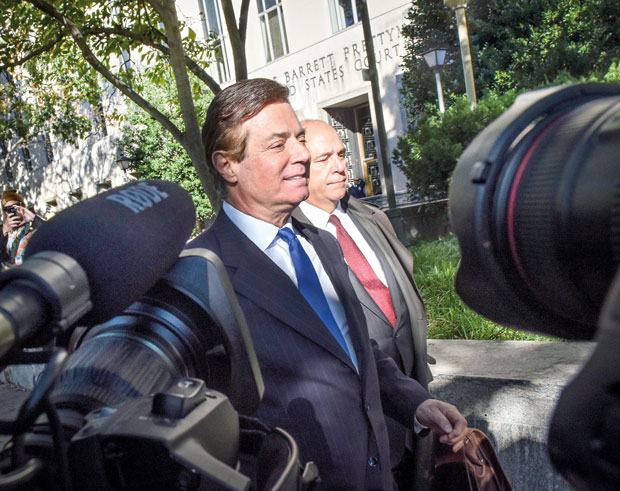01 Nov 2017 - {{hitsCtrl.values.hits}}

By Michael Scherer (c) 2017, The Washington Post · Oct 31, 2017 -
WASHINGTON - The hardest part for official Washington, D.C., is not knowing what happens next.
Amid the fast-moving criminal investigation into Russian involvement in the 2016 election, every corner of the city finds itself preparing for the unexpected. Democrats fret that President Donald Trump might try to shut down the inquiry. Republicans worry that their last best hope for a legislative win, a tax overhaul, could fall victim to the scandal. And the president’s denial that his campaign worked in any way with Russia continues to be tested by new disclosures. The only person with any significant control over events, Special Counsel Robert Mueller, offered no hints Monday on his next move beyond the day’s bombshells - a series of legal filings, including the indictment of two former Trump campaign officials and the guilty plea of a third.And the possibilities seemed only to grow as the day wore on. Hours after the first indictments landed, a leading Democratic lobbyist, Tony Podesta, announced that he would leave his firm, after his firm’s apparent role in a Ukrainian lobbying campaign was described in court papers.
The release of the charges followed the disclosure that a prominent Democratic lawyer and a news outlet backed by a major Republican donor had at different times paid a firm that compiled opposition research on Trump alleging ties to Russian interests that could threaten national security.
Mueller has signaled that he will seek to turn every stone in his search and use all available legal tools. Monday’s court papers revealed that he had decided to file charges under the Foreign Agents Registration Act, a nearly 80-year-old law that regulates lobbying for foreign powers but that rarely leads to criminal charges.
Legal experts say the Mueller investigation is likely to bring more charges, not to mention a protracted legal process that is likely to distract from other priorities.
Already, there are signs that the growing scandal has begun to distract from a key week for Republicans looking to build momentum behind tax legislation.
On Capitol Hill, Senate Majority Leader Mitch McConnell, R-Ky., avoided questions from reporters on the indictments. At a separate event, House Speaker Paul Ryan said this when asked about the indictments: “I really don’t have anything to add, other than nothing’s going to derail what we’re doing in Congress.”
Even the president found himself caught off guard, when he prematurely tweeted his own absolution hours after indictments were announced of his former campaign chairman, Paul Manafort, and a top deputy, Rick Gates. At 10:25 a.m., Trump felt it safe to boast that the announcements did not directly reference his campaign.
“Sorry, but this is years ago, before Paul Manafort was part of the campaign,” Trump wrote on Twitter. “Also, there is NO COLLUSION!”
Minutes later, Mueller’s team announced a previously secret guilty plea of a third Trump campaign adviser, George Papadopoulos, who worked on foreign policy in a volunteer capacity. In court papers, Papadopoulos described in detail his 2016 efforts to arrange contacts with people he knew to be Russian agents, including one person who had told him about Russian “dirt” on Democratic candidate Hillary Clinton, including “thousands of emails.”
Papadopoulos pleaded guilty to giving false statements to federal agents in his initial interviews about the interactions. He now says that he discussed the Russian overtures he had received with several other people in the Trump campaign, including a “senior policy adviser,” “campaign supervisor” and a “high-ranking campaign official.” Among the campaign officials he emailed were campaign manager Corey Lewandowski, campaign chairman Paul Manafort and national campaign co-chairman Sam Clovis.
The campaign officials are not identified in court documents, but some of the emails cited by federal prosecutors match messages described in August to The Washington Post by people familiar with their contents.
White House press secretary Sarah Huckabee Sanders chose not to acknowledge that confession later in the day. “Today’s announcement has nothing to do with the president, has nothing to do with the president’s campaign or campaign activity,” she said, arguing that the work by Papadopoulos to coordinate a Russian meeting with the campaign did not amount to a campaign effort.
Podesta’s decision to leave his firm amounted to the first collateral damage for Democrats from the Russian investigation. One of the party’s most powerful lobbyists and effective fundraisers, he is also the brother of Clinton’s 2016 campaign chairman, John Podesta.
The Manafort and Gates indictments described the efforts of “Company B,” which appears to be Tony Podesta’s firm, the Podesta Group, to help the government of Ukraine. A principal from Podesta’s firm is described as privately warning Gates that his talking points on work on the lobbying contract could be contradicted by “lots of email traffic.”
Senate Minority Leader Charles Schumer put out a warning to Trump not to interfere with the ongoing probe. “If he does, Congress must respond swiftly, unequivocally and in a bipartisan way to ensure that the investigation continues,” he said in a statement.
15 Nov 2024 15 Nov 2024
15 Nov 2024 15 Nov 2024
15 Nov 2024 15 Nov 2024
15 Nov 2024 15 Nov 2024
15 Nov 2024 15 Nov 2024